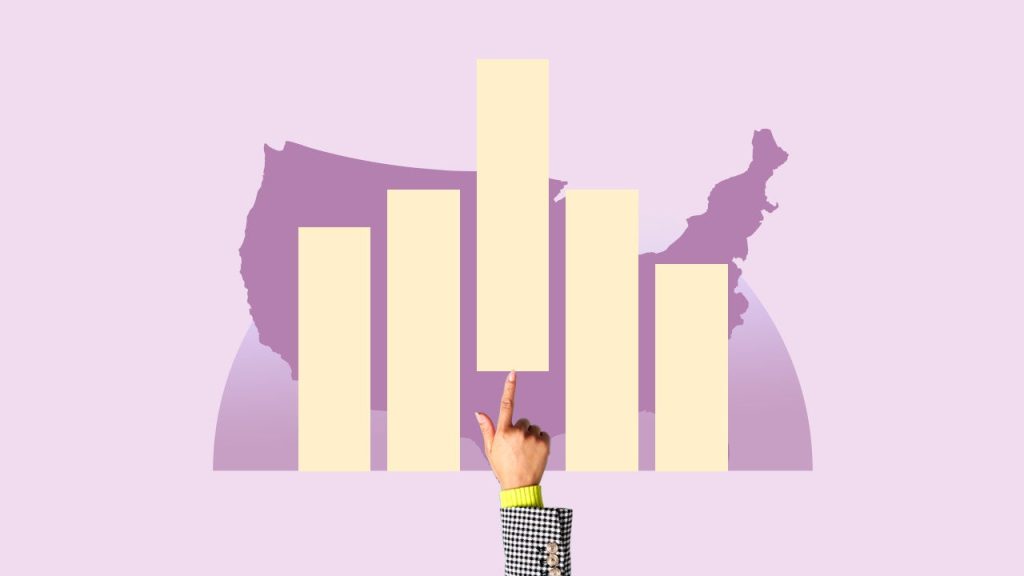Key takeaways
- Washington is the friendliest state for small businesses because of its robust small business activity, ample skilled labor and abundant small business financing.
- Many other Western states, including Utah, Wyoming, Idaho, Nevada and Oregon, rank in the top 10 for their small business environments.
- Louisiana, Mississippi and Rhode Island are the least friendly states for small businesses.
Entrepreneurship has skyrocketed in the aftermath of the COVID-19 pandemic. Just ask Morgan Lynch, owner of Jupiter’s Eye Cafe in Spokane, Washington. Lynch witnessed the phenomenon firsthand in her hometown and recently joined the city’s effort to revitalize its downtown.
“Our downtown has gone through a lot of ups and downs over the years, and it’s going through a revitalization post-COVID,” she says. “I wanted to leave my mark on it.”
She’s one of the millions of Americans who’ve started their own businesses in the years following the global shutdown. Over the last year, Lynch learned how to build a business plan, project cash flow and secured financing for her bookstore cafe, which will open by January 2025, thanks to the help of a free state resource known as the Washington Small Business Development Center.
“I could not have gotten where I am now without it, and the fact that it was free is amazing,” Lynch says.
It got us wondering at Bankrate: Are certain states in the U.S. better positioned to promote small business growth, especially in the years following the pandemic?
We investigated this question by analyzing over a dozen data points to rank all 50 states based on their small business environments. In Bankrate’s new Small Business Study, Washington landed the top spot as the friendliest state for small businesses because of its strong small business environment, skilled workforce and ample small business funding. Louisiana came in last for its small business environment.
While innovation and ingenuity are happening all over the country, our study reveals that some states are better positioned than others to promote small business growth. Many western states fared especially well in our rankings.
— Ted Rossman, Bankrate senior analyst
Which states are better positioned for small business growth?
Small businesses aren’t that small in terms of their economic impact. According to the U.S. Chamber of Commerce, they employ nearly half of all U.S. workers and account for nearly 44 percent of America’s gross domestic product (GDP).
That said, every state’s small business environment looks different. Some states have local economies concentrated in certain industries, like the entertainment and tourism industry in Las Vegas, Nevada. Some states have more robust economies. Some have better tax policies, more available workers for hire or better ecosystems for small business financing.
In our state ranking, the 18 data points we examined fit into these broad categories: robustness of small business activity, availability and quality of labor, business costs, access to capital, infrastructure and policy and regulation. While no state can tick all those boxes, states with relatively favorable conditions in many of these categories were most likely to rank higher on our list.
Here’s where states landed in the top 10 and bottom 10 of our ranking:
Top 10: Most friendly states for small businesses |
Bottom 10: Least friendly states for small businesses |
|---|---|
|
|
|
|
|
|
|
|
|
|
|
|
|
|
|
|
|
|
|
|
Bankrate data center
Every week, Bankrate publishes proprietary surveys, studies and rate data, providing the latest data-driven insights on the state of Americans’ personal finances — including credit card debt, homeownership, insurance, retirement and beyond.
See more
Western states have the friendliest small business environments
Many Western states, including Utah, Wyoming, Idaho, Nevada and Oregon, ranked in the top 10 for their small business environments. Washington took the No. 1 spot.
“Generally speaking, these states are tax-friendly, they have good infrastructure and a more educated pool of prospective employees,” Rossman says. Washington, Idaho and Oregon have less favorable business tax environments than Wyoming, Nevada and Utah.
Why Washington ranked No. 1 for its small business environment
Washington stands out in three categories we examined: access to capital, the robustness of small business activity and the availability of skilled workers. Washington’s biggest areas for improvement in our rankings are its business costs and tax policies.
Here’s a further breakdown of Washington’s small business environment:
Access to capital
Washington has over 600,000 small businesses and was approved for almost $965 million in 7(a) loans through the Small Business Administration (SBA) during the 2024 fiscal year. That put Washington in the No. 2 spot in the nation for access to capital for small businesses, after Utah. The 7(a) SBA loan program is the SBA’s primary business loan program for providing financial assistance to small businesses and one of the most popular small business loans.
Robustness of small business activity
Roughly half (49 percent) of Washington’s workforce was employed by small businesses as of 2021, according to the U.S. Census Bureau’s Statistics of U.S. Businesses. Washington’s per capita real gross domestic product (GDP) in 2023 was $86,682, the third highest in the nation. Between March 2021 and March 2022, 29,963 small businesses opened and 13,419 closed, for a net increase of 16,544. That puts Washington in the top 10 for the largest net increase of small businesses per capita.
Availability and quality of labor
According to the Bureau of Labor Statistics’ (BLS) Business Employment Dynamics data, small businesses in Washington contributed a net increase of 161,791 jobs between 2021 and 2022. That’s 86.2 percent of total net job creation in Washington, one of the highest percentages among all 50 states. Washington also has one of the highest ratios of available workers for every job opening amid a nationwide worker shortage crisis, according to the U.S. Chamber of Commerce. Besides the abundance of available labor, Washington also appears to have some of the most capable workers in the country, according to at least one measurement. When the National Center for Education Statistics measured the education level of adults living in the state, it found that Washington’s adults were more literate and more capable at math than their counterparts in other states.
Business costs
Washington’s hourly median wage, once adjusted for the cost of living ($26.24), is higher than most of the country. Higher wages can reduce profits for small business owners because they often have smaller profit margins. It’s also harder for small business owners to pass on added expenses to their customers to make up for those labor costs compared to large corporations.
Policy and regulation
Washington scored well for business policies. According to the SBE Council’s 2019 Small Business Policy Index, Washington is one of the most entrepreneur-friendly states for policy because it imposes lower governmental burdens on entrepreneurship, business and investment.
However, the state did not fare as well when it came to its tax environment. It has lower individual income tax rates than other states; however, the Tax Foundation says Washington imposes gross receipts taxes on businesses instead of corporate taxes, which are “generally thought to be more economically harmful.” Overall, the state lands in 35th place on the Tax Foundation’s 2024 State Business Tax Climate Index.
Infrastructure
Washington ranks 17th for infrastructure. While the state has strong internet speeds and robust electric utility performance, it falls short on its road and bridge conditions. Solid infrastructure is important for businesses, as it supports smooth operations, efficient production, reliable communication, access to resources and growth.
These states struggle with their small business environments
Many states, particularly in the South, didn’t fare well in our ranking. The states in the bottom five spots on our ranking include Louisiana, Mississippi, Rhode Island, West Virginia and Hawaii.
There are a few commonalities among states at the bottom of the ranking: They have higher poverty rates, lower levels of small business activity, weaker economies, more severe worker shortages and less educated workforces. Some states at the bottom of our ranking are also more prone to natural disasters, which can financially devastate small business communities and impact small business growth.
Why Louisiana came in last for its small business environment
Louisiana is the least friendly state for small businesses of all 50 states, ranking poorly in several metrics we analyzed. Here’s a detailed breakdown of its small business environment:
Access to capital
The total amount of Small Business Administration 7(a) loans approved based on the number of small businesses in the state is low, ranking 35th. This reveals a gap between the available capital for small businesses in Louisiana and the entities that can actually access that funding. The state received over $333 million in SBA 7(a) loans in fiscal year 2024 and has over 450,000 small businesses.
Bryan Greenwood, state director at the Louisiana Small Business Development Center, says capital is readily available in Louisiana, but many residents who want to open businesses may struggle to qualify for financing because of the state’s higher poverty rates. According to the nonprofit Louisiana Budget Project, the overall poverty rate in Louisiana was 18.6 percent in 2022, the second highest in the nation.
Robustness of small business activity
Louisiana is the only state that experienced a net decrease in small businesses between March 2021 and March 2022. State experts at the Louisiana Small Business Development Center pointed to Hurricane Ida as a likely reason. They said small businesses affected by the hurricane faced storm damage and a lack of power, water and internet service. Louisiana also landed in the bottom 15 states for the lowest per capita real GDP, signaling a weaker overall economy.
Availability and quality of labor
Louisiana is facing a worsened worker shortage, evidenced by the fact that there are only 55 workers for every 100 open jobs, according to the U.S. Chamber of Commerce. It also has some of the lowest average literacy and numeracy scores for adults in the country, compared to other states. BLS data shows Louisiana added the second-fewest small business jobs to its economy between March 2021 and March 2022.
Business costs
When adjusted for the cost of living, Louisiana’s hourly median wage ($21.93) is lower than in most states. This is the only metric in which Louisiana scored considerably better than other states. States with lower priced-adjusted median wages generally scored better on our ranking because employee wages can be a significant cost for small business owners.
Policy and regulation
Louisiana ranks poorly for its tax environment and is in the middle of the pack for its small business policies. Over the last two years, Louisiana made some significant changes to its business tax structure by lowering corporate and personal income tax rates and eliminating the corporate franchise tax. However, the state still ranks 40th for its overall business tax environment in the Tax Foundation’s 2024 State Business Tax Climate Index. The state’s business policies are also structured in a way that imposes on small business growth, ranking 29th in the SBE Council’s 2019 Small Business Policy Index.
Infrastructure
The state’s poor infrastructure — from internet speed to road condition to overall utility performance — also dragged it down on the ranking. It ranks 48th in this category.
The bottom line
There’s no denying that some small business owners have it better than others simply because of where their business is situated.
The location of your business can affect everything from business costs to what you pay in taxes, making it one of the most crucial factors that drives its success. Of course, location will matter more if you’re opening a business that relies on in-person interactions, like a retail store or restaurant, compared to an online-only business.
We’re not suggesting small business owners flock to the top states on our ranking. Rather, it’s important for them to understand that their state’s small business environment presents its own unique challenges and opportunities. Understanding these differences can help small business owners make better, more informed business decisions in their respective states.
-
State Overall ranking Access to capital Robustness of small business activity Infrastructure Availability/quality of labor Business costs Policy and regulation Washington 1 2 1 17 3 47 21 Utah 2 1 6 5 16 31 8 Wyoming 3 33 16 22 5 38 1 Idaho 4 6 8 12 13 21 22 Nevada 5 8 4 1 41 9 4 Florida 6 19 2 2 48 2 3 Oregon 7 25 43 4 7 11 39 New Hampshire 8 17 33 21 12 8 13 South Dakota 9 37 21 37 17 30 2 Colorado 10 3 10 18 22 44 16 Vermont 11 48 14 28 2 26 44 North Dakota 12 45 11 13 11 48 17 Minnesota 13 4 42 6 4 41 46 Alaska 14 5 15 49 1 48 5 Montana 15 31 38 31 6 36 14 Delaware 16 26 17 3 39 33 30 Kansas 17 14 34 11 24 34 29 Arizona 18 9 27 15 38 16 11 Georgia 19 11 9 10 44 15 26 Texas 20 13 18 19 43 13 6 Oklahoma 21 28 19 25 36 10 20 Maine 22 44 7 46 8 14 38 Wisconsin 23 7 31 38 15 39 31 North Carolina 24 16 28 29 35 22 9 Tennessee 25 41 20 7 42 17 12 South Carolina 26 20 26 16 40 4 23 New Jersey 27 18 13 9 23 35 50 Nebraska 28 24 40 14 20 40 35 Connecticut 29 23 22 35 10 43 45 Illinois 30 22 29 20 32 20 36 Virginia 31 38 32 26 29 24 19 California 32 15 5 27 34 19 49 Michigan 33 12 50 41 9 32 10 Indiana 34 50 41 23 31 29 7 Ohio 35 10 45 34 27 37 24 Massachusetts 36 32 12 36 19 50 42 Iowa 37 47 25 40 14 42 40 New York 38 40 3 33 26 44 48 Missouri 39 21 36 43 30 28 15 Pennsylvania 40 27 35 42 25 27 33 Maryland 41 39 30 24 33 46 43 Arkansas 42 46 23 32 45 4 37 Kentucky 43 43 46 30 37 24 28 Alabama 44 36 48 8 47 12 27 New Mexico 45 30 24 39 46 18 25 Hawaii 46 49 39 45 21 6 47 West Virginia 47 29 47 50 28 3 32 Rhode Island 48 34 49 47 18 23 41 Mississippi 49 42 37 44 50 1 18 Louisiana 50 35 44 48 49 7 34
Read the full article here









